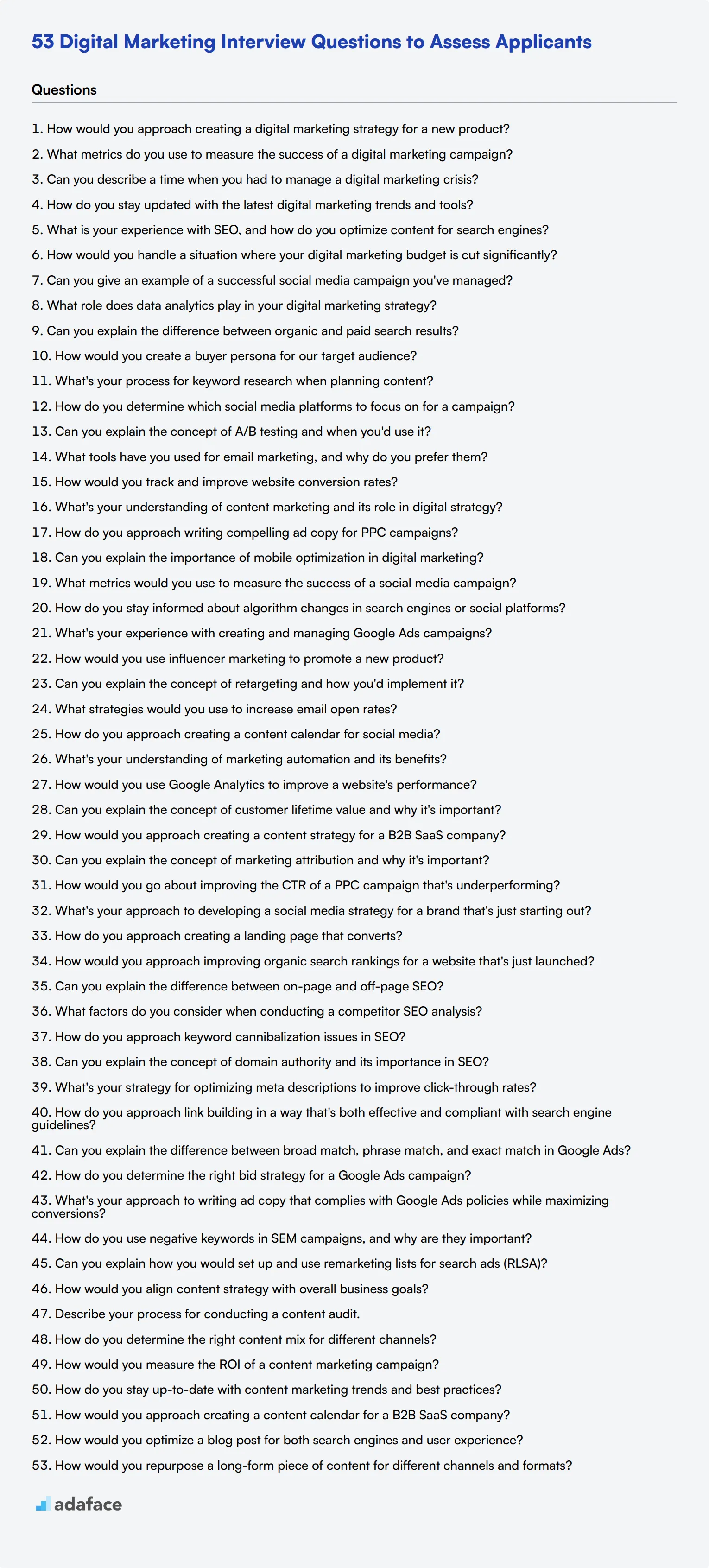Recruiting the right candidates for a digital marketing role can be challenging, given the diverse skill sets required. Asking targeted interview questions is key to identifying the best fit for your team and avoiding bad hires that can impact morale and productivity.
In this blog post, we present a curated list of digital marketing interview questions designed to help you assess candidates from junior to mid-tier levels, as well as their expertise in SEO, SEM, and content strategy. Each question is crafted to provide insights into the applicant's knowledge, skills, and problem-solving abilities.
Using these questions will streamline your interview process and improve your hiring outcomes. Additionally, consider implementing our digital marketing test before interviews to filter top talent effectively.
Table of contents
8 general Digital Marketing interview questions and answers to assess applicants
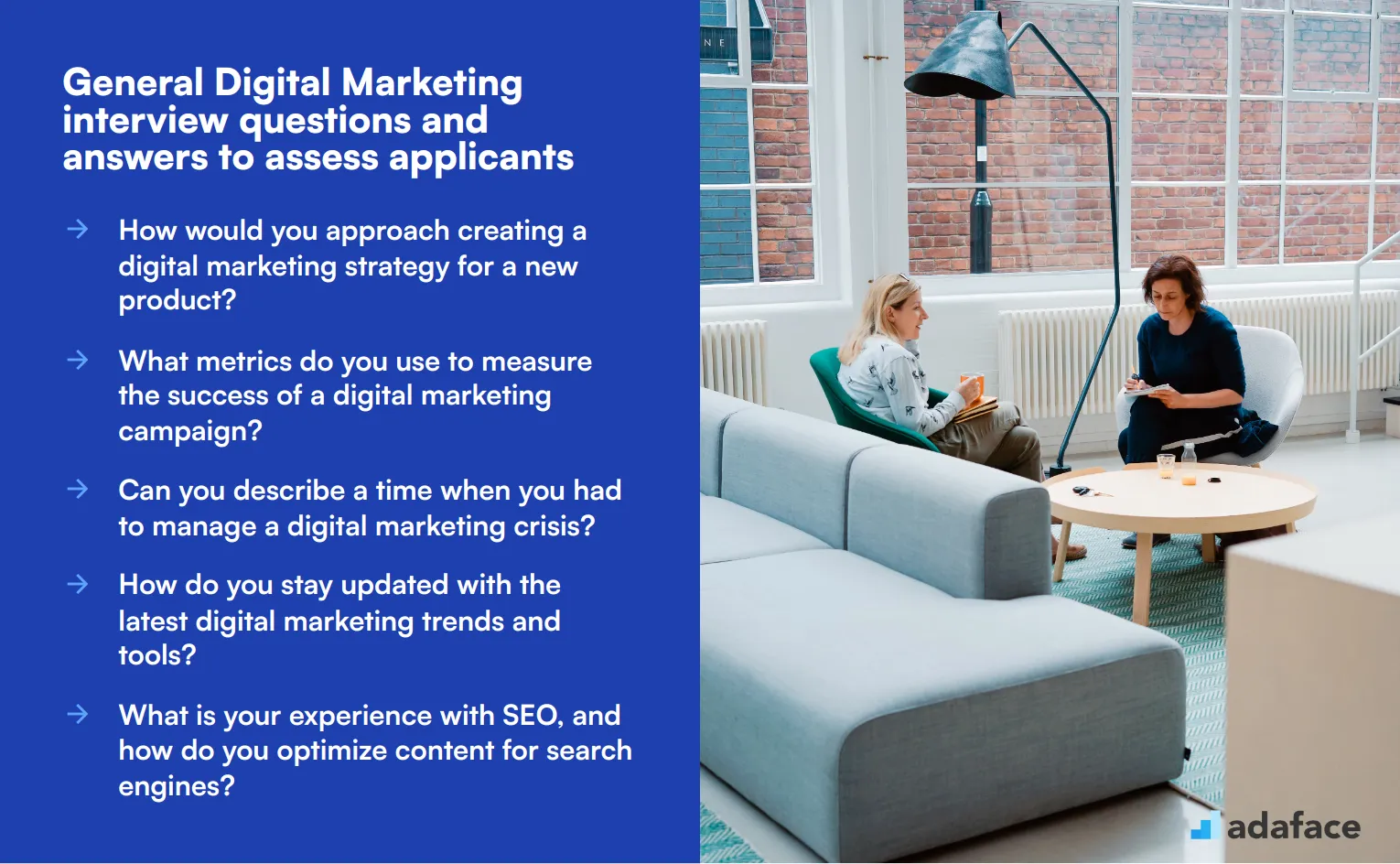
To make sure you're choosing the best fit for your digital marketing team, it's crucial to ask the right questions during the interview. This list of questions and expected answers will help you assess an applicant's knowledge and practical skills, ensuring they can tackle real-world challenges effectively.
1. How would you approach creating a digital marketing strategy for a new product?
A strong candidate will explain that their approach starts with understanding the target audience and the unique selling points of the product. They might mention conducting market research to identify customer pain points and competitors.
They should then outline a step-by-step plan that includes setting clear goals, choosing the right digital marketing channels (such as SEO, social media, email marketing), creating a content plan, and analyzing the performance metrics to make necessary adjustments.
Look for candidates who can articulate their process clearly and provide past examples of successful strategies they've implemented. Their answer should show an ability to think strategically and adapt to different scenarios.
2. What metrics do you use to measure the success of a digital marketing campaign?
Candidates should mention key performance indicators (KPIs) such as conversion rates, click-through rates (CTR), return on investment (ROI), and customer acquisition cost (CAC).
They may also discuss the importance of tracking engagement metrics like social media interactions, website traffic, and email open rates to get a holistic view of a campaign's performance.
An ideal response will include specific examples of how they have used these metrics in the past to adjust their strategies and achieve better results. Look for a data-driven mindset and the ability to interpret and act on the data collected.
3. Can you describe a time when you had to manage a digital marketing crisis?
A good candidate will provide a specific example of a crisis they handled, such as a negative social media backlash or a sudden drop in website traffic.
They should explain the steps they took to address the issue, including identifying the root cause, communicating with stakeholders, and implementing a solution to mitigate the damage.
Look for responses that demonstrate problem-solving skills, the ability to stay calm under pressure, and a proactive approach to preventing similar issues in the future.
4. How do you stay updated with the latest digital marketing trends and tools?
Candidates might mention subscribing to industry blogs, attending webinars and conferences, or participating in online courses. They could also highlight the importance of networking with other professionals and being active in digital marketing communities.
They should emphasize the relevance of continuous learning and staying adaptable to new technologies and trends to remain competitive in the field.
An ideal response will show a genuine interest in professional development and a proactive approach to staying informed about industry changes. Look for candidates who can provide specific examples of how they have applied new trends or tools in their work.
5. What is your experience with SEO, and how do you optimize content for search engines?
Candidates should describe their experience with keyword research, on-page optimization, and link-building strategies. They might mention using tools like Google Analytics and SEMrush to track and improve SEO performance.
They should explain the importance of creating high-quality, relevant content that meets the needs of the target audience while following SEO best practices, such as using proper meta tags, headers, and alt texts.
Look for responses that demonstrate a solid understanding of SEO principles and the ability to apply them in practical scenarios. Strong answers will include specific examples of successful SEO campaigns they've managed.
6. How would you handle a situation where your digital marketing budget is cut significantly?
A strong candidate will explain that they would start by reassessing the current marketing plan to identify the most cost-effective channels and tactics. They might mention focusing on organic strategies like content marketing and SEO to maximize reach with minimal spend.
They should discuss prioritizing high-impact campaigns and reallocating resources to areas with the highest ROI. Additionally, they might mention leveraging data and analytics to make informed decisions and justify budget allocations.
Look for responses that show a strategic mindset and the ability to adapt to changing circumstances. Candidates should demonstrate resourcefulness and a focus on maximizing efficiency.
7. Can you give an example of a successful social media campaign you've managed?
Candidates should provide a specific example, detailing the goals of the campaign, the social media platforms used, and the content strategy implemented. They might mention using a combination of organic posts and paid ads to reach their target audience.
They should highlight the results achieved, such as increased engagement, follower growth, or lead generation. Discussing the metrics used to measure success and any adjustments made during the campaign is also important.
Look for responses that demonstrate creativity, a clear understanding of the target audience, and the ability to achieve measurable results. Strong candidates will provide concrete examples and data to back up their success stories.
8. What role does data analytics play in your digital marketing strategy?
Candidates should explain that data analytics is crucial for understanding campaign performance, identifying trends, and making data-driven decisions. They might mention using tools like Google Analytics, social media insights, and CRM systems to gather and analyze data.
They should discuss how they use data to optimize campaigns, personalize content, and improve targeting. They might also mention the importance of A/B testing to determine the most effective strategies.
Look for responses that show a strong analytical mindset and the ability to interpret data to drive marketing decisions. Candidates should provide examples of how data analytics has helped them achieve better results in their previous roles.
20 Digital Marketing interview questions to ask junior marketers
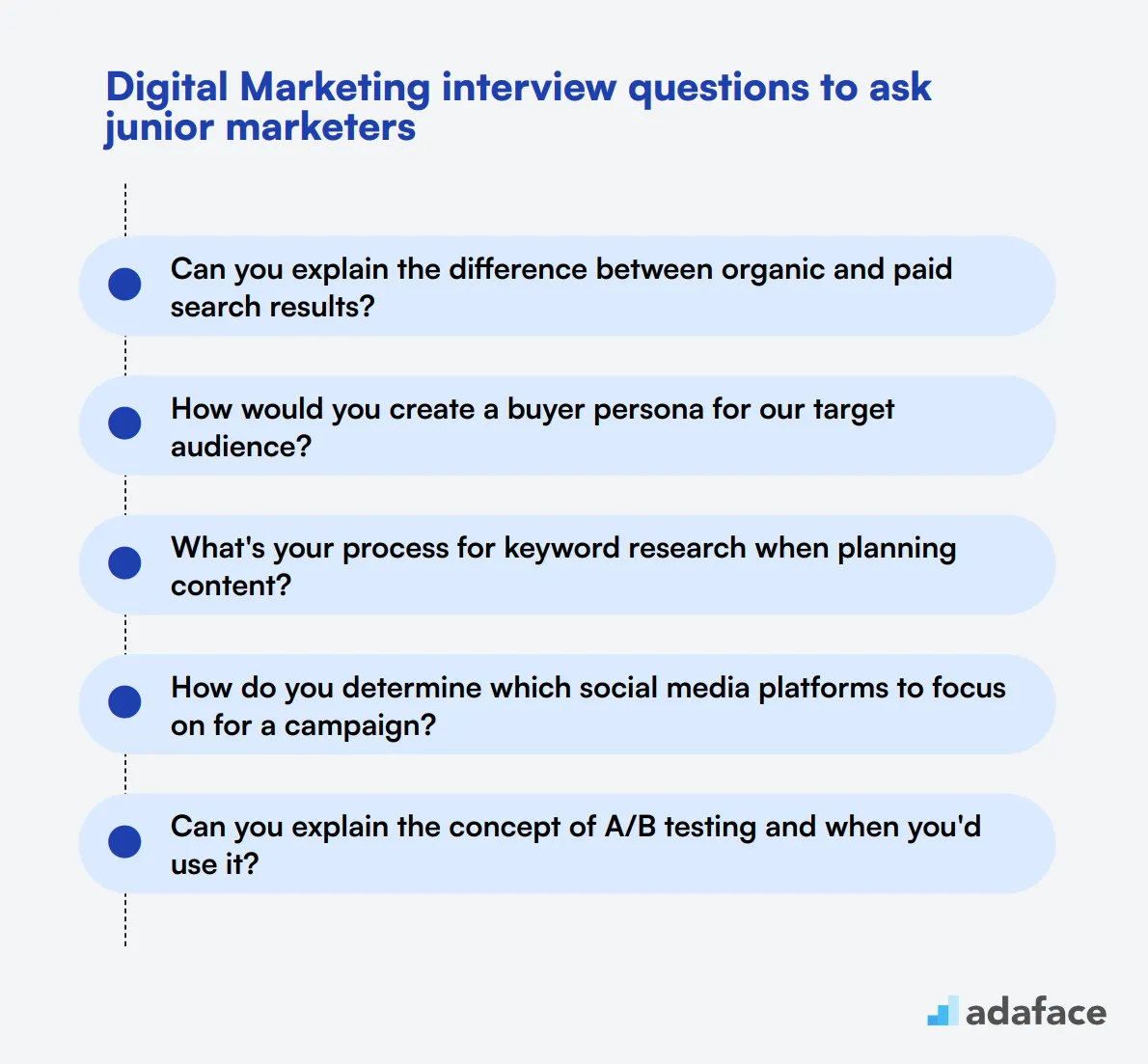
When interviewing junior digital marketers, it's crucial to assess their foundational knowledge and practical skills. Use these questions to gauge their understanding of basic concepts, tools, and strategies in digital marketing. They'll help you identify candidates who can hit the ground running and contribute effectively to your team's goals.
- Can you explain the difference between organic and paid search results?
- How would you create a buyer persona for our target audience?
- What's your process for keyword research when planning content?
- How do you determine which social media platforms to focus on for a campaign?
- Can you explain the concept of A/B testing and when you'd use it?
- What tools have you used for email marketing, and why do you prefer them?
- How would you track and improve website conversion rates?
- What's your understanding of content marketing and its role in digital strategy?
- How do you approach writing compelling ad copy for PPC campaigns?
- Can you explain the importance of mobile optimization in digital marketing?
- What metrics would you use to measure the success of a social media campaign?
- How do you stay informed about algorithm changes in search engines or social platforms?
- What's your experience with creating and managing Google Ads campaigns?
- How would you use influencer marketing to promote a new product?
- Can you explain the concept of retargeting and how you'd implement it?
- What strategies would you use to increase email open rates?
- How do you approach creating a content calendar for social media?
- What's your understanding of marketing automation and its benefits?
- How would you use Google Analytics to improve a website's performance?
- Can you explain the concept of customer lifetime value and why it's important?
5 intermediate Digital Marketing interview questions and answers to ask mid-tier marketers
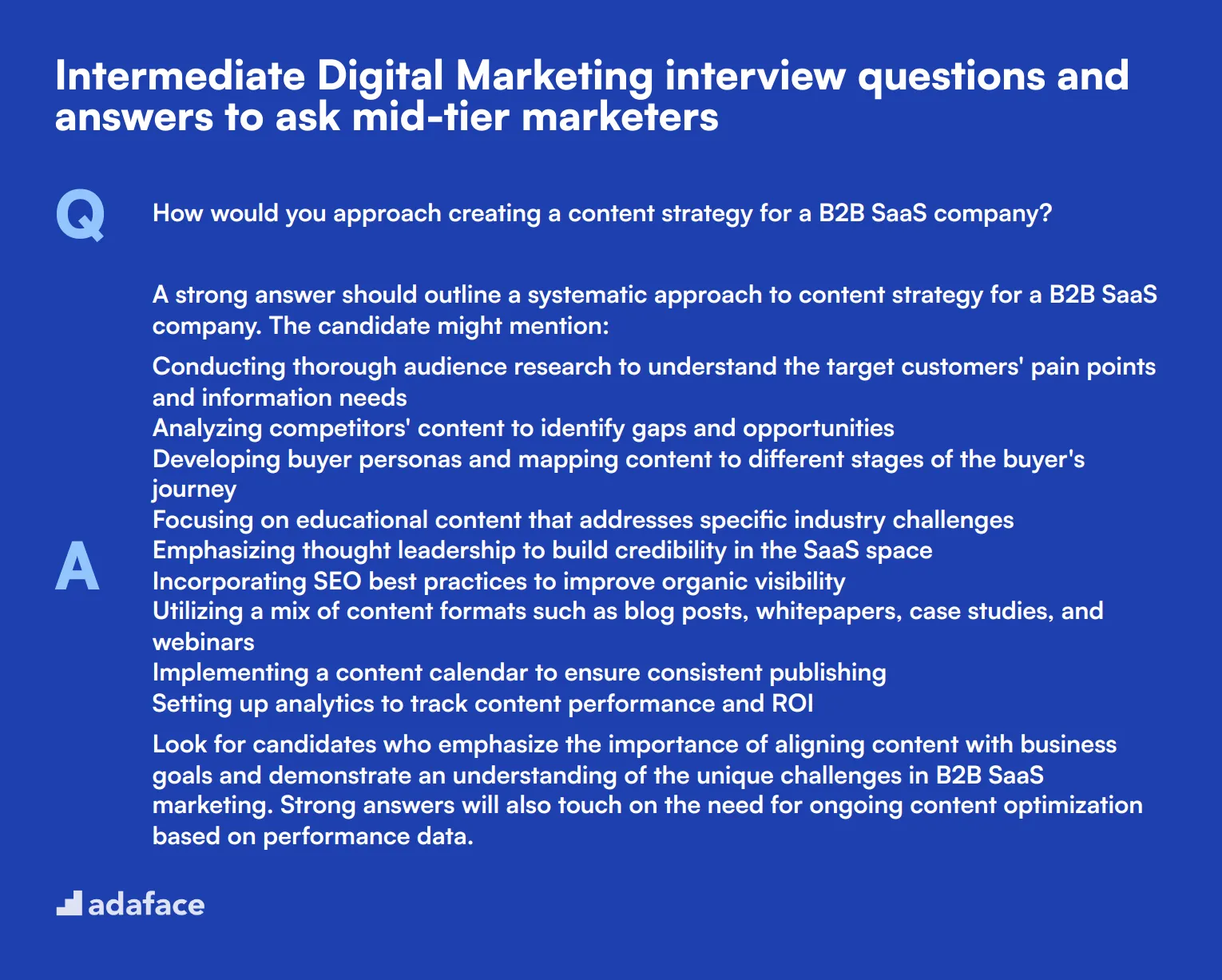
Ready to level up your digital marketing interview game? These intermediate questions are perfect for assessing mid-tier marketers who've got some experience under their belt. Use them to dig deeper into a candidate's strategic thinking and practical know-how. Remember, the best digital marketers can explain complex concepts simply, so listen for clear, concise responses.
1. How would you approach creating a content strategy for a B2B SaaS company?
A strong answer should outline a systematic approach to content strategy for a B2B SaaS company. The candidate might mention:
- Conducting thorough audience research to understand the target customers' pain points and information needs
- Analyzing competitors' content to identify gaps and opportunities
- Developing buyer personas and mapping content to different stages of the buyer's journey
- Focusing on educational content that addresses specific industry challenges
- Emphasizing thought leadership to build credibility in the SaaS space
- Incorporating SEO best practices to improve organic visibility
- Utilizing a mix of content formats such as blog posts, whitepapers, case studies, and webinars
- Implementing a content calendar to ensure consistent publishing
- Setting up analytics to track content performance and ROI
Look for candidates who emphasize the importance of aligning content with business goals and demonstrate an understanding of the unique challenges in B2B SaaS marketing. Strong answers will also touch on the need for ongoing content optimization based on performance data.
2. Can you explain the concept of marketing attribution and why it's important?
Marketing attribution is the process of identifying which marketing touchpoints contribute to a conversion or sale. It helps marketers understand the customer journey and determine which channels and campaigns are most effective in driving desired outcomes.
A good answer should cover:
- Different attribution models (e.g., first-touch, last-touch, multi-touch)
- The importance of attribution in optimizing marketing spend
- Challenges in implementing attribution, such as cross-device tracking
- How attribution informs budget allocation and strategy decisions
- The role of tools and technologies in attribution modeling
Look for candidates who can explain the concept clearly and provide examples of how they've used attribution insights to improve campaign performance. Strong answers will also acknowledge the complexities of attribution in today's multi-channel marketing landscape.
3. How would you go about improving the CTR of a PPC campaign that's underperforming?
An effective answer should demonstrate a structured approach to improving Click-Through Rate (CTR) in a Pay-Per-Click (PPC) campaign. Key points to cover include:
- Reviewing and refining ad copy to make it more compelling and relevant
- A/B testing different ad variations to identify what resonates best with the audience
- Improving ad relevance by tightening keyword groups and using negative keywords
- Enhancing ad extensions to provide more information and increase ad real estate
- Adjusting bid strategies to improve ad position
- Analyzing the landing page experience and ensuring it matches ad promises
- Segmenting campaigns by device, location, or time to target high-performing segments
- Utilizing ad scheduling to show ads during peak engagement times
Look for candidates who emphasize the importance of data-driven decision making and continuous optimization. Strong answers will also touch on the relationship between Quality Score and CTR, and how improving one can positively impact the other.
4. What's your approach to developing a social media strategy for a brand that's just starting out?
A comprehensive answer should outline a step-by-step approach to developing a social media strategy for a new brand. Key elements to look for include:
- Conducting a thorough audience analysis to understand where the target demographic spends time online
- Researching competitors' social media presence to identify opportunities and gaps
- Defining clear, measurable goals aligned with overall business objectives
- Selecting appropriate social media platforms based on audience presence and brand fit
- Creating a content strategy that balances promotional and value-added content
- Developing a consistent brand voice and visual identity across platforms
- Setting up a content calendar and scheduling tools for consistent posting
- Implementing a community management plan for engagement and customer service
- Establishing KPIs and analytics tracking to measure performance
- Planning for paid social media advertising to boost initial visibility
A strong candidate will emphasize the importance of starting small, testing different approaches, and scaling based on what works. They should also mention the need for flexibility and adaptability in the early stages of a social media strategy. Look for answers that demonstrate an understanding of social media coordination and its role in overall digital marketing efforts.
5. How do you approach creating a landing page that converts?
An effective answer should demonstrate a systematic approach to creating high-converting landing pages. Key points to cover include:
- Clearly defining the page's goal and target audience
- Crafting a compelling headline and subheadline that communicate the unique value proposition
- Using persuasive and benefit-focused copy
- Incorporating trust elements such as testimonials, social proof, or security badges
- Designing a clear and prominent call-to-action (CTA)
- Ensuring the page is visually appealing and matches the brand's aesthetic
- Optimizing page load speed for better user experience
- Making the page mobile-responsive
- Removing navigation to keep visitors focused on the conversion goal
- A/B testing different elements to continually improve performance
Look for candidates who emphasize the importance of alignment between the landing page and the traffic source (e.g., ads, emails). Strong answers will also touch on the need for ongoing optimization based on analytics data and user feedback. Candidates should demonstrate an understanding of how landing pages fit into the broader content strategy and conversion funnel.
12 Digital Marketing interview questions about SEO and SEM
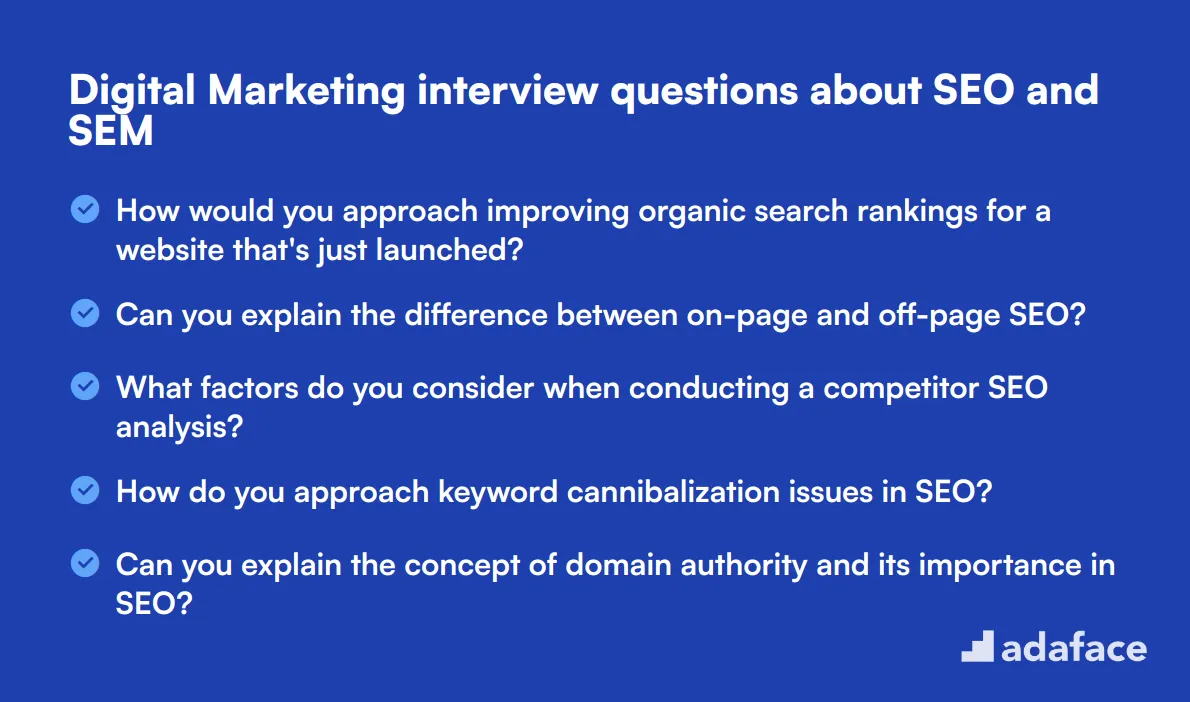
To assess candidates' proficiency in SEO and SEM, crucial components of digital marketing, use these interview questions. They'll help you gauge a candidate's understanding of search engine optimization strategies and paid search marketing techniques.
- How would you approach improving organic search rankings for a website that's just launched?
- Can you explain the difference between on-page and off-page SEO?
- What factors do you consider when conducting a competitor SEO analysis?
- How do you approach keyword cannibalization issues in SEO?
- Can you explain the concept of domain authority and its importance in SEO?
- What's your strategy for optimizing meta descriptions to improve click-through rates?
- How do you approach link building in a way that's both effective and compliant with search engine guidelines?
- Can you explain the difference between broad match, phrase match, and exact match in Google Ads?
- How do you determine the right bid strategy for a Google Ads campaign?
- What's your approach to writing ad copy that complies with Google Ads policies while maximizing conversions?
- How do you use negative keywords in SEM campaigns, and why are they important?
- Can you explain how you would set up and use remarketing lists for search ads (RLSA)?
8 Digital Marketing interview questions and answers related to content strategy
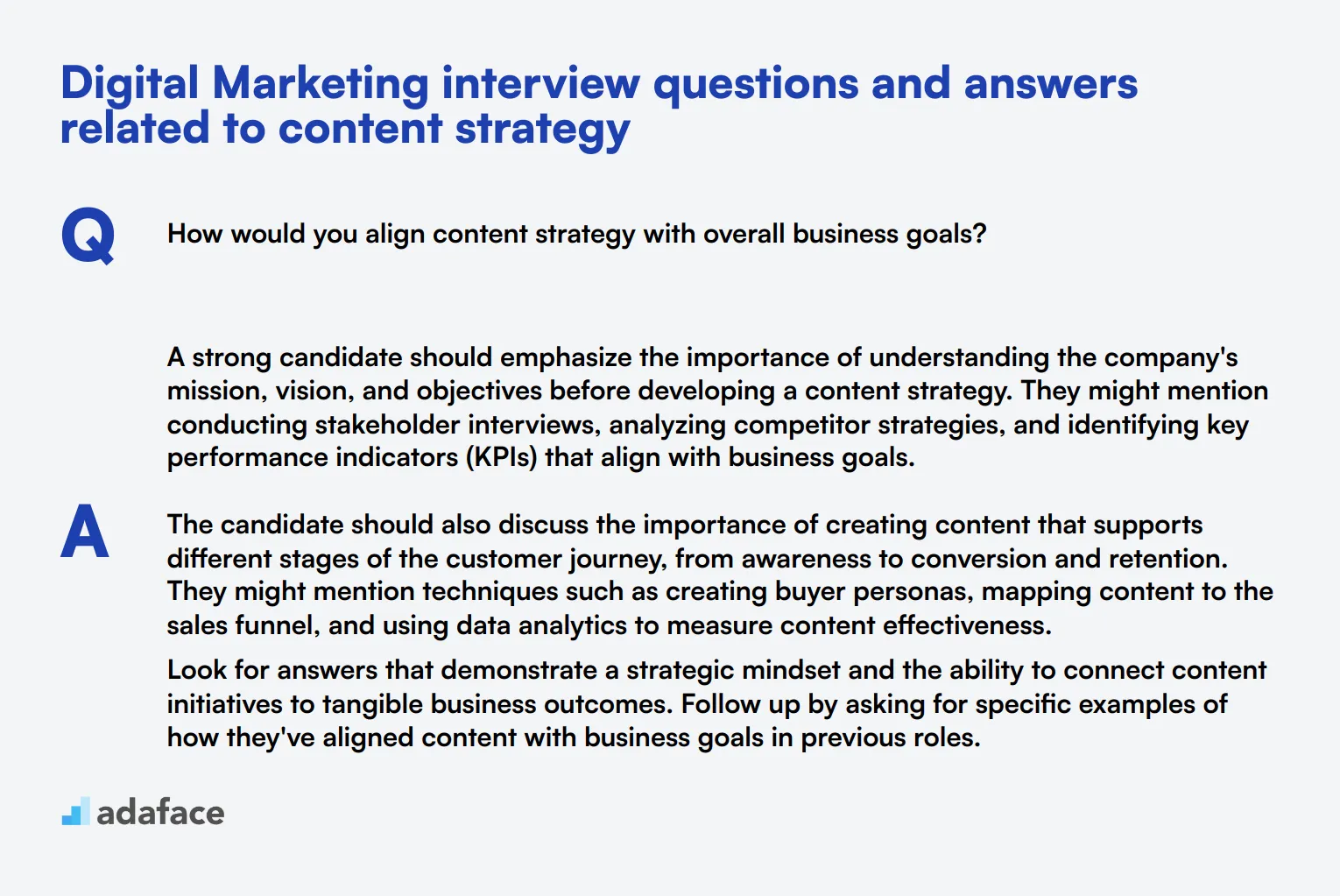
When it comes to content strategy, asking the right questions can make all the difference in finding the perfect content strategist for your team. These 8 digital marketing interview questions will help you gauge a candidate's understanding of content strategy fundamentals and their ability to apply them in real-world scenarios. Use them to spark insightful discussions and uncover each applicant's unique approach to content creation and distribution.
1. How would you align content strategy with overall business goals?
A strong candidate should emphasize the importance of understanding the company's mission, vision, and objectives before developing a content strategy. They might mention conducting stakeholder interviews, analyzing competitor strategies, and identifying key performance indicators (KPIs) that align with business goals.
The candidate should also discuss the importance of creating content that supports different stages of the customer journey, from awareness to conversion and retention. They might mention techniques such as creating buyer personas, mapping content to the sales funnel, and using data analytics to measure content effectiveness.
Look for answers that demonstrate a strategic mindset and the ability to connect content initiatives to tangible business outcomes. Follow up by asking for specific examples of how they've aligned content with business goals in previous roles.
2. Describe your process for conducting a content audit.
An ideal response should outline a systematic approach to evaluating existing content. The candidate might mention steps such as:
- Cataloging all content across various platforms
- Assessing content quality, relevance, and performance
- Identifying content gaps and opportunities
- Analyzing content for SEO optimization
- Evaluating content against competitor offerings
Look for candidates who emphasize the importance of data-driven decision-making in this process. They should mention using analytics tools to assess content performance and gathering insights from user engagement metrics. A strong answer might also include how they would present findings and recommendations based on the audit results.
3. How do you determine the right content mix for different channels?
A comprehensive answer should demonstrate an understanding of various content formats and their suitability for different platforms. The candidate might discuss:
- Analyzing audience preferences and behavior on each channel
- Considering the strengths and limitations of each platform
- Aligning content types with marketing funnel stages
- Experimenting with different content formats and measuring results
- Adapting content for cross-channel distribution
Look for candidates who emphasize the importance of a data-driven approach to content distribution. They should mention using analytics to track performance and adjust the content mix accordingly. A strong answer might also include examples of how they've successfully tailored content for specific channels in past roles.
4. How would you measure the ROI of a content marketing campaign?
A strong answer should demonstrate a clear understanding of both content-specific metrics and broader business KPIs. The candidate might mention:
- Traffic metrics: Page views, unique visitors, time on page
- Engagement metrics: Social shares, comments, likes
- Conversion metrics: Lead generation, email sign-ups, sales
- SEO metrics: Organic traffic, keyword rankings, backlinks
- Brand metrics: Brand awareness, sentiment, loyalty
Look for candidates who emphasize the importance of setting clear goals and KPIs at the outset of a campaign. They should also mention the need to use tools like Google Analytics and social media insights to track performance. A comprehensive answer might include discussion of attribution models to understand the customer journey and the role of content in driving conversions.
5. How do you stay up-to-date with content marketing trends and best practices?
An ideal response should showcase the candidate's commitment to continuous learning and professional development. They might mention:
- Following industry thought leaders on social media
- Regularly reading marketing blogs and publications
- Attending webinars, conferences, and workshops
- Participating in online communities and forums
- Experimenting with new tools and technologies
Look for candidates who demonstrate genuine enthusiasm for the field and a proactive approach to learning. A strong answer might include specific examples of how they've applied new skills required for content strategists or techniques learned through these methods in their work. Consider asking follow-up questions about recent trends they find particularly interesting or impactful.
6. How would you approach creating a content calendar for a B2B SaaS company?
A comprehensive answer should outline a strategic approach to content planning. The candidate might discuss:
- Identifying key business objectives and marketing goals
- Researching target audience pain points and interests
- Mapping content to different stages of the buyer's journey
- Planning a mix of evergreen and timely content
- Incorporating product updates, industry events, and seasonal trends
- Balancing different content formats (blog posts, whitepapers, case studies, videos)
Look for candidates who emphasize the importance of collaboration with other teams (sales, product, customer success) to inform content ideas. They should also mention the need for flexibility in the calendar to accommodate emerging opportunities or shifts in strategy. A strong answer might include discussion of tools they use for content planning and how they measure the effectiveness of their content calendar.
7. How would you optimize a blog post for both search engines and user experience?
A strong answer should demonstrate a balance between SEO best practices and user-centric content creation. The candidate might mention:
- Conducting keyword research to identify relevant search terms
- Optimizing meta titles, descriptions, and header tags
- Creating engaging, informative content that addresses user intent
- Using internal and external links to provide additional value
- Optimizing images with alt text and descriptive file names
- Ensuring mobile responsiveness and fast page load times
- Incorporating clear calls-to-action (CTAs)
Look for candidates who emphasize that the ultimate goal is to create valuable content for users, not just to rank in search engines. They should understand that good SEO practices often align with good user experience. A comprehensive answer might include discussion of how they use analytics to continually refine and improve content performance.
8. How would you repurpose a long-form piece of content for different channels and formats?
An ideal response should showcase creativity and strategic thinking in content distribution. The candidate might suggest:
- Breaking the content into a series of blog posts or articles
- Creating an infographic or data visualization
- Developing a video or animated explainer
- Crafting social media posts with key takeaways
- Producing a podcast episode or audio summary
- Designing a downloadable PDF guide or checklist
- Hosting a webinar or live Q&A session based on the content
Look for candidates who emphasize the importance of adapting the content to suit each channel's unique characteristics and audience preferences. They should also mention the benefits of repurposing, such as extending content lifespan and reaching different audience segments. A strong answer might include examples of successful content repurposing from their past experience.
Which Digital Marketing skills should you evaluate during the interview phase?
It's impossible to evaluate every aspect of a candidate's prowess in digital marketing from a single interview. However, focusing on certain core skills can greatly aid in determining their overall competence and suitability for your team. Here are some key digital marketing skills you should consider during the interview phase.
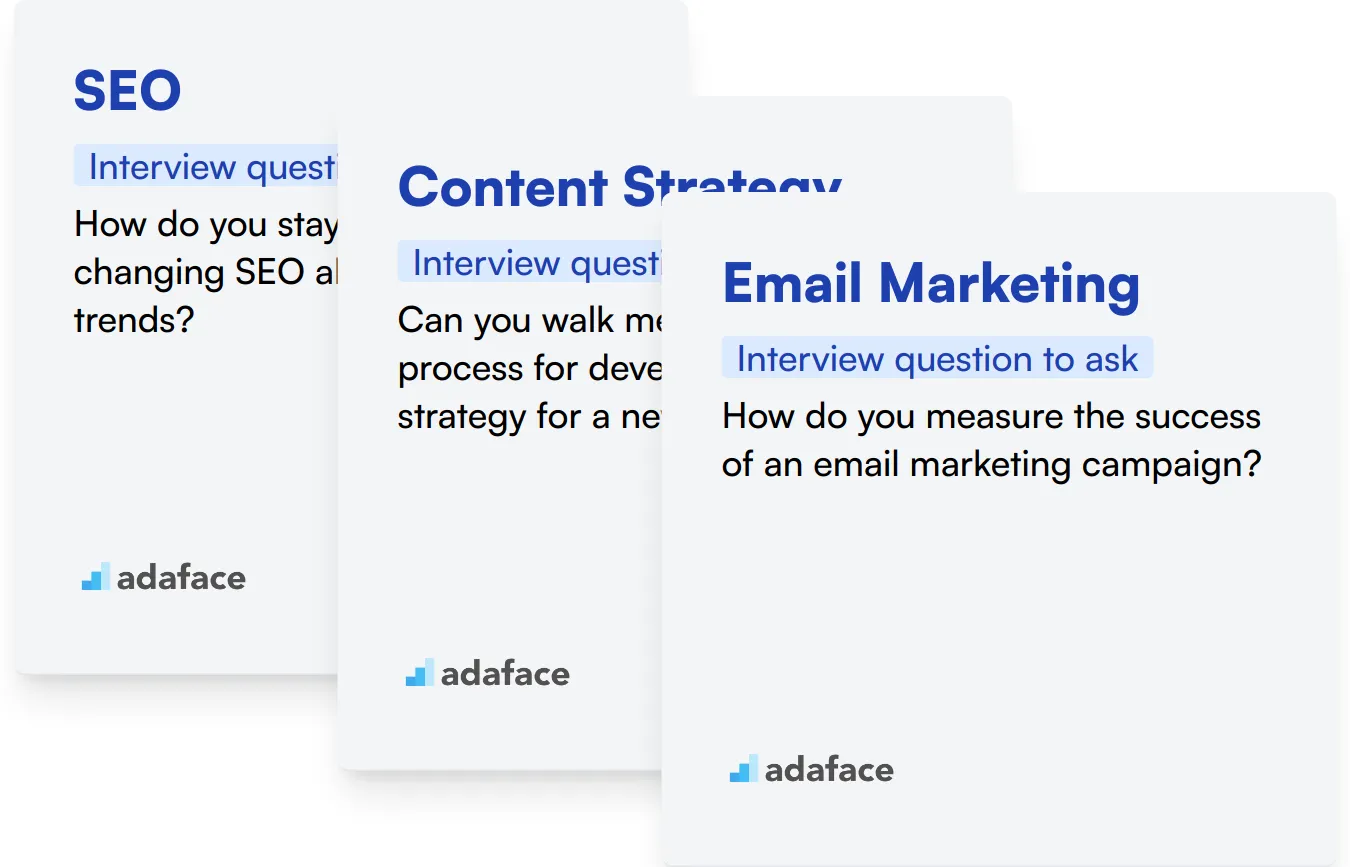
SEO
SEO is critical for ensuring that a company's content is discoverable by search engines. A strong understanding of SEO can significantly enhance online visibility and drive organic traffic to the website.
To assess this skill, consider using an assessment test that asks relevant MCQs. You can use our SEO assessment test for this purpose.
You can also gauge a candidate's SEO knowledge by asking targeted questions during the interview.
How do you stay updated with the changing SEO algorithms and trends?
Look for answers that mention credible sources of SEO updates such as industry blogs, forums, and SEO tools. Candidates should demonstrate a proactive approach to learning.
Content Strategy
Content strategy is vital for creating and distributing valuable, relevant content to attract and engage a target audience. It plays a pivotal role in driving brand awareness and customer retention.
To evaluate this skill, you can use a test that includes questions specific to content strategy. Consider our Content Strategy assessment test.
During the interview, ask questions that delve into their experience and approach in content strategy.
Can you walk me through your process for developing a content strategy for a new product?
Look for a structured approach that includes audience research, content planning, and performance metrics. The candidate should be able to articulate their strategy clearly.
Email Marketing
Email marketing remains one of the most effective channels for direct communication with customers. Mastery of this skill can lead to increased customer engagement, retention, and sales.
It's beneficial to use an assessment test with relevant MCQs to assess a candidate's knowledge in email marketing. You can utilize our Digital Marketing test which includes email marketing questions.
Ask targeted questions to understand their hands-on experience and insights into email marketing.
How do you measure the success of an email marketing campaign?
Candidates should mention key metrics such as open rates, click-through rates, conversion rates, and ROI. Look for candidates who use these metrics to iteratively improve their campaigns.
3 Tips for Effectively Using Digital Marketing Interview Questions
Before you start implementing what you've learned from this guide, here are some key tips to enhance your interview process.
1. Incorporate Skills Tests Before Interviews
Using skills tests prior to interviews allows you to gauge a candidate's practical abilities and knowledge. This helps in filtering candidates who may excel in interviews but lack the necessary skills.
Consider using tests like the Digital Marketing Test or the Google Ads Test to assess their proficiency. These tests provide objective insights into their capabilities.
Implementing these tests can streamline your selection process, ensuring that only the most qualified candidates make it to the interview stage. This sets the stage for a more focused and effective interview.
2. Curate Targeted Interview Questions
During the interview, time is limited, so it's essential to prioritize your questions. Selecting focused and relevant questions will maximize your chances of evaluating candidates effectively.
Consider asking about related skills, such as SEO knowledge or social media strategy. For example, questions about their approach to SEO and content marketing can yield valuable insights.
Having a concise list of questions ensures you cover important aspects without overwhelming the candidate. Aim to balance technical and soft skills to get a comprehensive view of the applicant.
3. Utilize Follow-Up Questions
Just asking initial interview questions might not reveal the true depth of a candidate's expertise. Follow-up questions are necessary to clarify responses and explore areas of uncertainty.
For instance, if a candidate states they have experience with PPC advertising, a follow-up question like, 'Can you describe a PPC campaign you managed and its results?' can uncover their practical knowledge and depth of experience.
Such probing questions help you understand the candidate's true capabilities and ensure that their skills align well with the position requirements.
Use Digital Marketing interview questions and skills tests to hire talented marketers
When hiring someone with digital marketing skills, it's important to ensure they possess the necessary competencies. The most accurate way to assess these skills is through targeted skill tests, such as the Digital Marketing Test or the Google Ads Test.
Once you've implemented these tests, you can efficiently shortlist the best candidates for interviews. To get started, sign up on our platform to access these assessments and enhance your hiring process: Sign Up Here.
Digital Marketing Test
Download Digital Marketing interview questions template in multiple formats
Digital Marketing Interview Questions FAQs
Look for candidates with a basic understanding of digital marketing principles, eagerness to learn, and some hands-on experience with digital marketing tools.
Ask specific questions about their strategies, tools they use, and how they measure success. Real-life scenarios can also shed light on their problem-solving abilities.
Mid-tier marketers should demonstrate strategic thinking, experience with multiple campaigns, and the ability to analyze and improve performance metrics.
Content strategy aligns marketing efforts with business goals, ensuring that all content produced is purposeful and contributes to the overall marketing objectives.
Yes, practical tests can provide insight into a candidate's real-world skills, such as creating a sample social media plan or analyzing a mock Google Analytics report.
Combining well-structured interview questions with practical tests and real-world scenarios will give a comprehensive view of the candidate's abilities.

40 min skill tests.
No trick questions.
Accurate shortlisting.
We make it easy for you to find the best candidates in your pipeline with a 40 min skills test.
Try for freeRelated posts
Free resources




